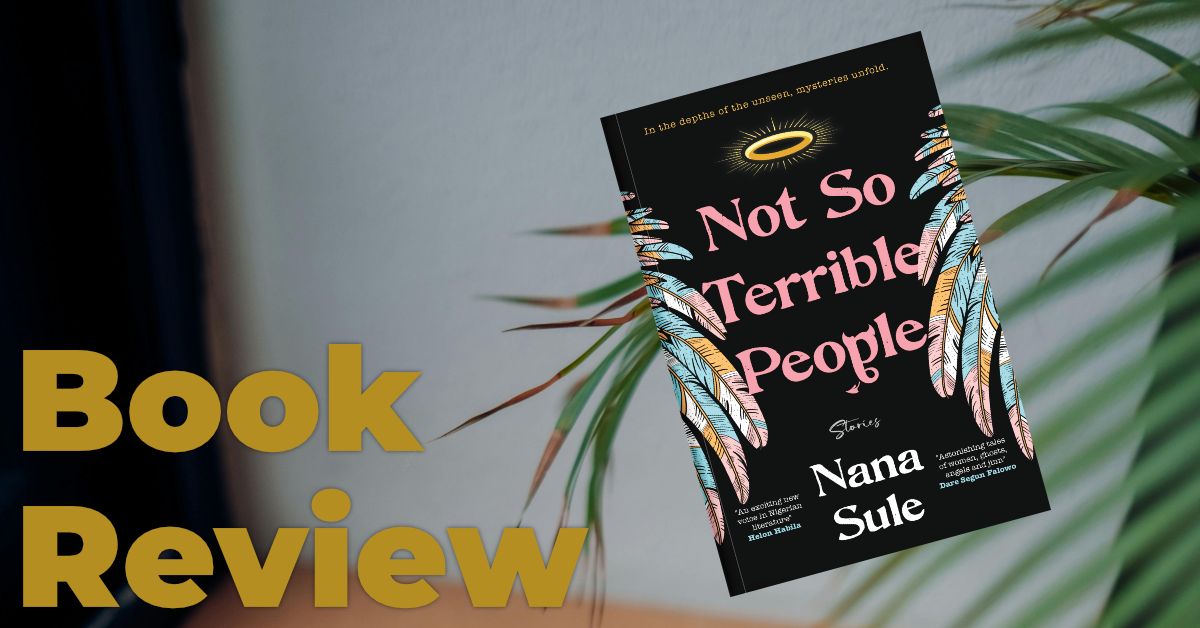Warning: Spoilers roam these paragraphs!
Nana Sule’s Not So Terrible People is an urban fantasy collection of stories that are so intricately woven together, it reads almost like a novella. This is no mistake, though. The author cites Helon Habila’s Waiting for an Angel as their inspiration for this direction. However, readers must decide for themselves whether this does the stories justice.
I’m a sucker for most genres under the speculative fiction banner, so I went in excited, expecting jinn, ancient curses, and demons. And I got them all. What I didn’t see coming were angels. As a whole, the book tells the tale of a fallen angel seeking redemption and forgiveness, but instead of serving some form of penance for eternity, he decides to be reborn in the image of man. The somewhat nefarious plot unfolds across eleven stories, each named after key characters swept up in events beyond their control.
A Mundane Blend of the Supernatural
The first story, “Amal,” is probably my best of the lot, thanks to the titular character’s personality. She attempts to convince the angels of the grave to let her return to life to prevent a great tragedy. Humour fills the story despite the serious situation, and no other tale hits quite like this one. The author also introduces a few angels, essentially setting up our fantasy expectations.
Each story is named after the “protagonist” of the tale, but I use this word tentatively because many of them end in tragedy or on a cliffhanger that isn’t resolved in this book. This is what happened to me with the story “Amal,” leaving me wanting more.
It is particularly frustrating when I remember “Rahila.” The story serves only to provide more context for one of the previous stories, “Ohunene.” It reinforces the bond between both women, highlights how they met, and explains what Ohunene is up to after her husband disappears. Some scenes are overly suspenseful, while others lay everything out for you, naked and bare. But we never get to explore the mind of this character, whose story should have been the focus.
Another frustrating thing was the choice of names. Most are clearly of Ebira origin, and that is quite refreshing because I rarely come across Nigerian myths that don’t originate from one of the big three ethnic groups. What irked me was how most of these names began with the letter “O.” The short nature of the stories made it difficult to sort out the names I was unfamiliar with. Then to add to the puzzle, in three instances, we meet women who share strong bonds and dreams, have a favourite hangout spot, with almost all of them having experienced abuse in the past or present.
The biggest problem I have with the book, though, is tiny editorial issues. The kind that nag at you, like misplaced words and typos. Some word choices even pulled me out of the fiction entirely. It’s a knock on the publisher and unfair to a debut writer, but nothing a new edition can’t fix.
Then there’s the length of certain stories, specifically “Bilya.” It’s so short, it should have just been absorbed into one of the other stories. It is insightful but not necessary as a stand-alone. This, in my opinion, depicts how Not So Terrible People could have worked much better as a novella. Or better still, a full-blown novel. I say novel because many of the ideas, great as they are, feel rushed, crammed into a series of short stories that are begging to be expanded upon. The pacing also suffers in the later stories, as if the author is in a hurry to end the book. More than a few times, I caught myself referring to the stories as chapters. It’s almost as if the author was desperate to begin a sequel.
Yes, you read that right. I said sequel. Despite the impression my words may have invoked in you so far, I must confess that I loved Not So Terrible People for the things it got right. An intriguing story, a handful of interesting characters, great dialogue, and supernatural beings. Taking mystical elements from the Islamic faith without making the stories about religion was a huge plus that belies the author’s skill as a writer. It was also interesting to see how they played around with a host of angels, like Izrail, Jibreel, Malaika, and the flock.
A Truly Captivating Page-Turner
Not So Terrible People is a not-so-terrible collection of short stories. In fact, it’s a pretty good one, though marred by editing errors and weird pacing around the end. It’s a book that will have you turning pages in quick succession, leaving you wanting answers and more stories. There’s a lot of telling, not showing, especially in the last two stories, “Oyiza” and “Laila.” It takes something from them but also creates a sense of urgency—a rush to cross the finish line. The real issue with Nana Sule’s debut speculative fiction is that it teases you, hooks you, and then leaves you hanging.
I want to read her next book. A better polished, more fleshed out tale in the urban fantasy landscape of northern Nigeria. I’m fairly certain that if that happens, I’ll be writing another not-so-terrible review.




